from May. 22, 1865
Letter from Pablo Herrera
-
Full Title
Letter from Pablo Herrera to Mr. Hassaurek
-
Description
Pablo Herrera, foreign minister of Ecuador, expressed his nation’s condolences to the United States on May 22, 1865.
-
Transcription
Transcription is available through the Department of State Office of the Historian
-
Source
-
Rights
This item is in the public domain and may be reproduced and used for any purpose, including research, teaching, private study, publication, broadcast or commercial use, with proper citation and attribution.
-
Tags
-
Cite this Item
Pablo Herrera. "Letter from Pablo Herrera to Mr. Hassaurek". Remembering Lincoln. Web. Accessed July 16, 2025. https://rememberinglincoln.fords.org/node/1208
-
Creator
Pablo Herrera
-
Date
May 22, 1865
from May. 22, 1865
Letter from Pablo Herrera to Mr. Hassaurek
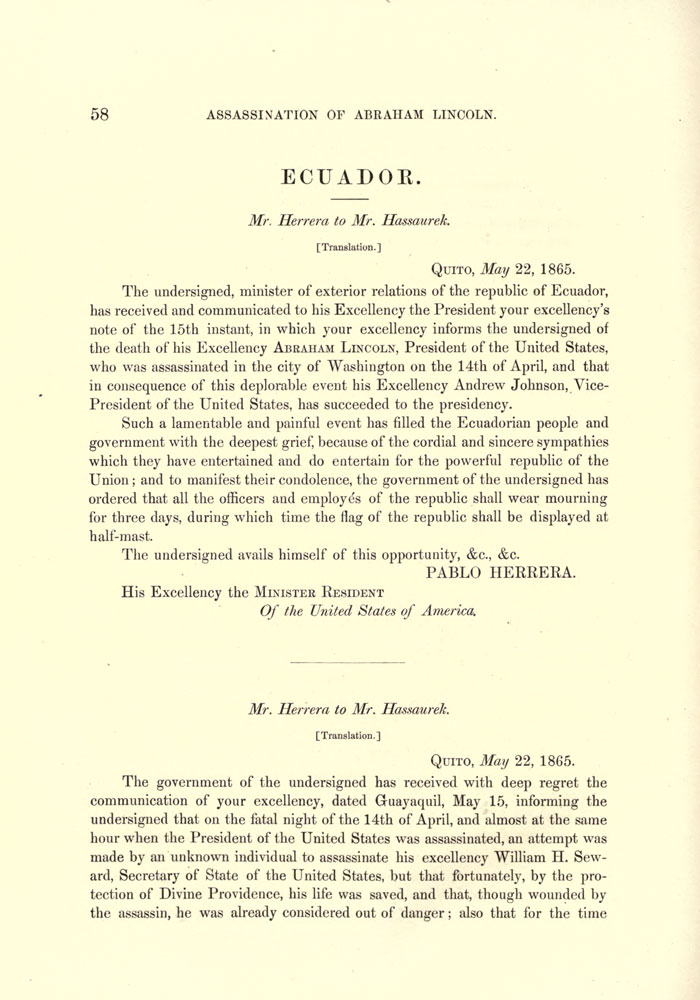
-
Description
Pablo Herrera, foreign minister of Ecuador, expressed his nation’s condolences to the United States on May 22, 1865.
-
Source
-
Rights
This item is in the public domain and may be reproduced and used for any purpose, including research, teaching, private study, publication, broadcast or commercial use, with proper citation and attribution.
-
Creator
Pablo Herrera
-
Date
May 22, 1865
from May. 2, 1865
Inhabitants of Zurich
-
Full Title
Inhabitants of Zurich
-
Description
A letter of condolences written to the US Government by a committee of residents from the Swiss city of Zurich. The committee praises the Union victory over the Confederacy, noting its impacts on not only the United States but also "all mankind". While mourning Lincoln, the document makes comparisons between Lincoln's impact and the previous global political impact of the Revolutionary War and George Washington. This letter provides a window into global reactions to the end of the war, as well as international opinions on what the role of a post-war United States would look like.
-
Transcription
Transcription is available via the Department of State Office of the Historian.
-
Source
-
Rights
This item is in the public domain and may be reproduced and used for any purpose, including research, teaching, private study, publication, broadcast or commercial use, with proper citation and attribution.
-
Tags
-
Cite this Item
O. Bulle. "Inhabitants of Zurich". Remembering Lincoln. Web. Accessed July 16, 2025. https://rememberinglincoln.fords.org/node/1205
-
Creator
O. Bulle
-
Date
May 2, 1865
from May. 2, 1865
Inhabitants of Zurich
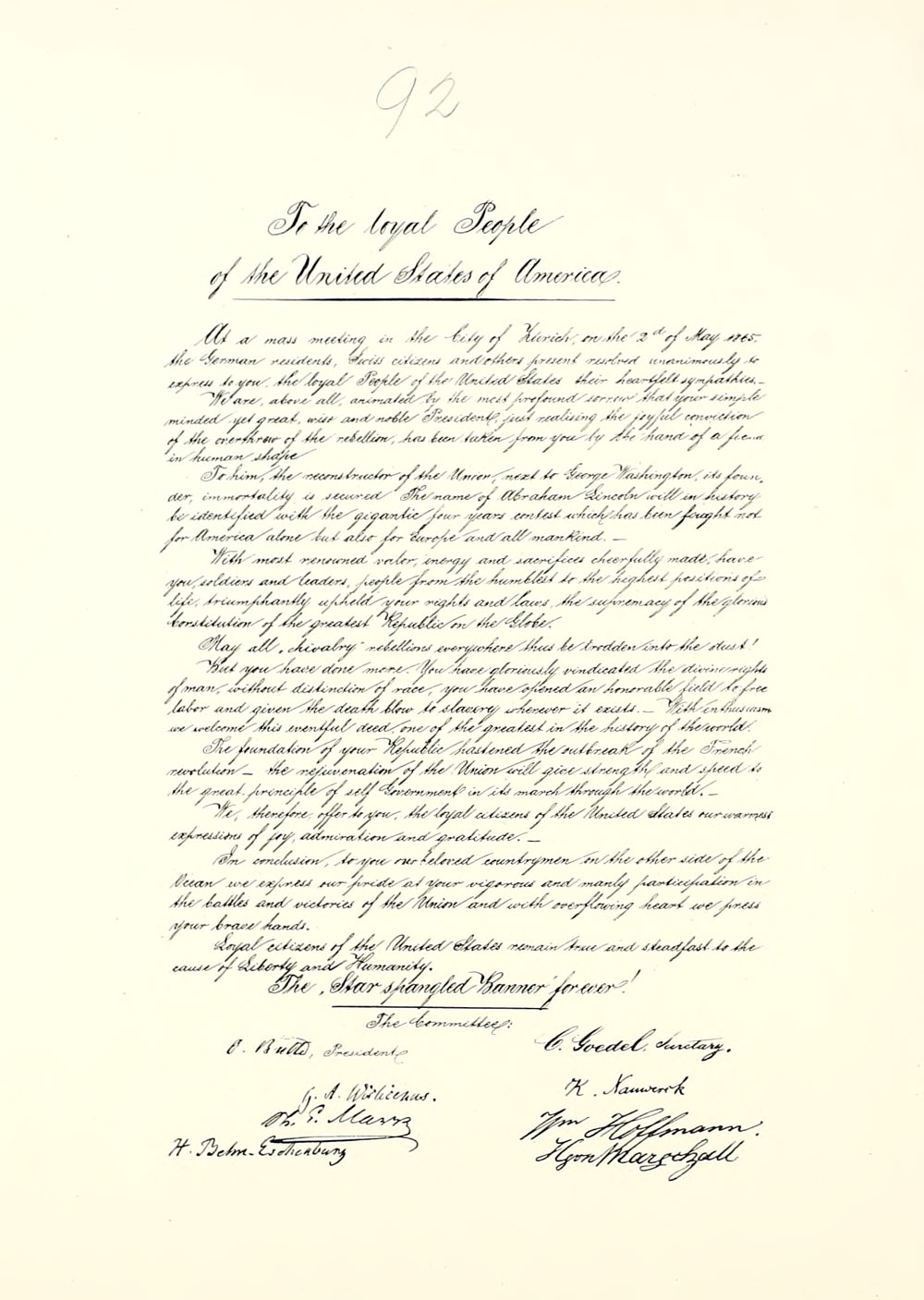
-
Description
A letter of condolences written to the US Government by a committee of residents from the Swiss city of Zurich. The committee praises the Union victory over the Confederacy, noting its impacts on not only the United States but also "all mankind". While mourning Lincoln, the document makes comparisons between Lincoln's impact and the previous global political impact of the Revolutionary War and George Washington. This letter provides a window into global reactions to the end of the war, as well as international opinions on what the role of a post-war United States would look like.
-
Source
-
Rights
This item is in the public domain and may be reproduced and used for any purpose, including research, teaching, private study, publication, broadcast or commercial use, with proper citation and attribution.
-
Creator
O. Bulle
-
Date
May 2, 1865
from Feb. 12, 1909
Francisco Perea Recollections of Lincoln Assassination
-
Full Title
Mr. Lincoln Was Always Intensely Interested in Affairs of New Mexico
-
Description
This article features an interview with Francisco Perea, a former member of the House of Representatives from the territory of New Mexico during the Civil War. Perea was present at Ford's Theatre on the night of the assassination, and in this interview he recounts his experiences and the changes he saw in the atmosphere of Washington and it's residents. Perea was also familiar with President Lincoln before the assassination and reflects fondly on their personal and business relations prior to his death.
-
Source
-
Rights
This item is in the public domain and may be reproduced and used for any purpose, including research, teaching, private study, publication, broadcast or commercial use, with proper citation and attribution.
-
Tags
-
Cite this Item
Albuquerque Morning Journal. "Mr. Lincoln Was Always Intensely Interested in Affairs of New Mexico". Library of Congress. Remembering Lincoln. Web. Accessed July 16, 2025. https://rememberinglincoln.fords.org/node/1202
-
Creator
Albuquerque Morning Journal
-
Publisher
Library of Congress
-
Date
February 12, 1909
from Feb. 12, 1909
Mr. Lincoln Was Always Intensely Interested in Affairs of New Mexico
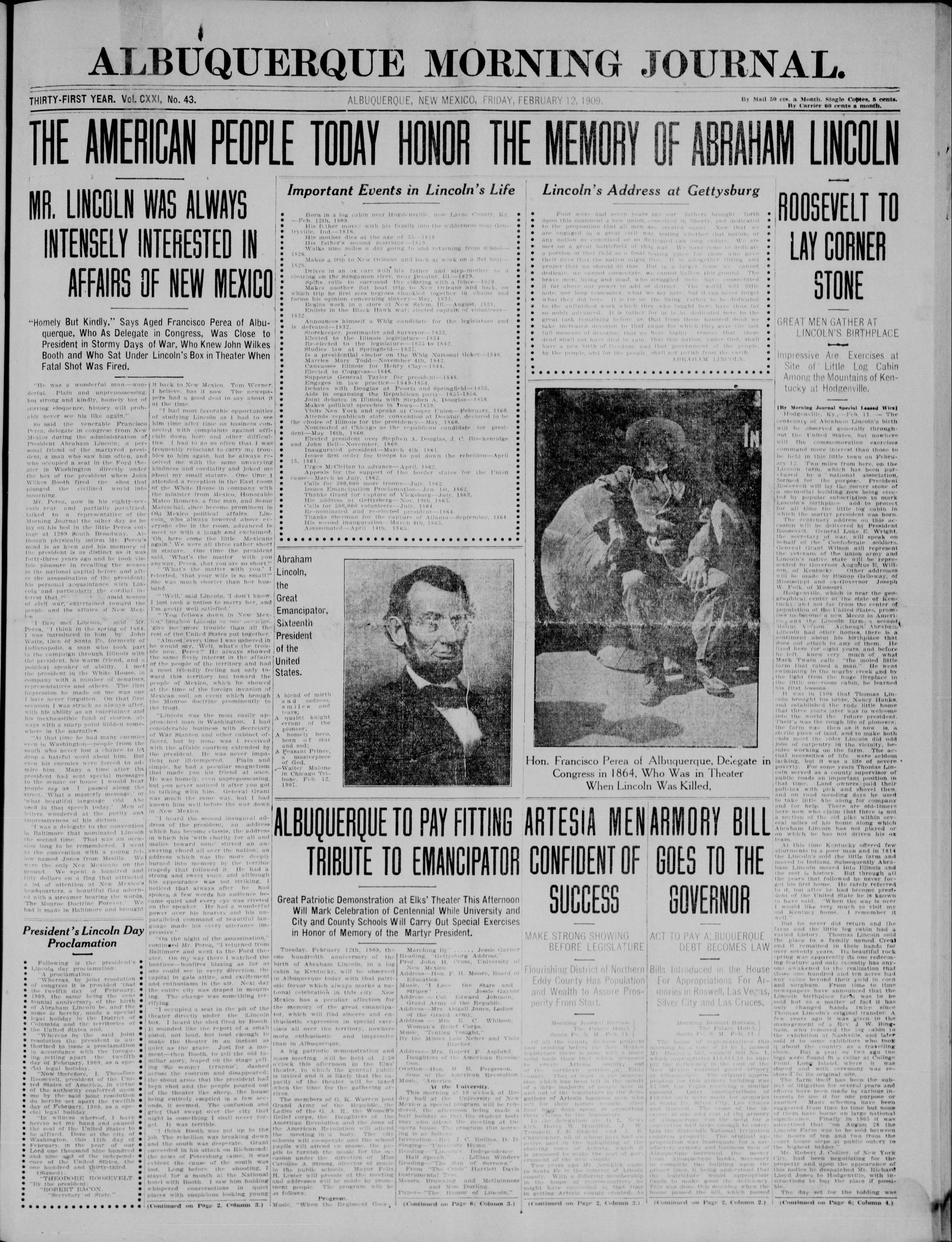
-
Description
This article features an interview with Francisco Perea, a former member of the House of Representatives from the territory of New Mexico during the Civil War. Perea was present at Ford's Theatre on the night of the assassination, and in this interview he recounts his experiences and the changes he saw in the atmosphere of Washington and it's residents. Perea was also familiar with President Lincoln before the assassination and reflects fondly on their personal and business relations prior to his death.
-
Source
-
Rights
This item is in the public domain and may be reproduced and used for any purpose, including research, teaching, private study, publication, broadcast or commercial use, with proper citation and attribution.
-
Creator
Albuquerque Morning Journal
-
Publisher
Library of Congress
-
Date
February 12, 1909
from Apr. 15, 1965
The Rebel Fiends at Work
-
Full Title
The Rebel Fiends at Work
-
Description
The Nashville Daily Union was one of the few newspapers that was established during and that survived the Civil War. This article prints a dispatch from Secretary of War Edward Stanton to Major General Dix recounting the details of Abraham Lincoln's assassination. The article falsely states that Edward Stanton was also killed. It concludes by declaring that a scheduled procession and illuminations in Nashville will not occur as a consequence of these events.
-
Transcription
NASHVILLE UNION
Extra.
Saturday Morning, April 15th, 1865.
THE REBEL FIENDS AT WORK.
President Lincoln Shot.
Secretary Seward Stabbed.
The President and Mr. Seward both Dead.
Grief of Mrs. Lincoln.
Seward’s Son and At-tendants Attacked.
Young Seward’s Skull Fractured.
Wilkes Booth the Pre-sident’s Assassin.
Seward’s Assassin Es-caped.
Nc Celebration in Nash-ville.
Washington, April 15th, 12:30 AM – The President was shot in the Theatre tonight; he is perhaps mortally wounded.
2nd DISPATCH – The President is not expected to live through the night. He was shot at the Theatre. Secretary Seward was also assassinated. No arteries were cut.
Washington, April 15.- President Lincoln and wife with their friends this evening visited Ford’s theatre for the purpose of witnessing the performance of American Cousin. It was announced in the papers that Gen. Grant would also be present, but he left by the late train of cars for New Jersey. The Theatre was densely crowded and every body seemed delighted with the scene before them. During the 3d act and while there was a temporary pause for one of the actors to enter, the sharp report of a pistol was heard which merely attracted attention but suggested nothing serious, until a man rushed to the front of the President’s box waving a long dagger in his right hand, and exclaiming Sic Semper Tyrannis and immediately leaped from the box which was in the second tier to the stage beneath and ran across to the opposite side of the stage, making his escape amid the bewilderment of the audience, from the rear of the theatre, and mounting a horse fled.
The screams of Mrs. Lincoln first disclosed the fact to the audience that the President had been shot, when all present rose to their feet, rushing to the stage, many exclaiming hang him. The excitement was of the wildest pos-sible description, and of course there was an abrupt intermission of theatrical performances.
There was a rush toward the Presi-dent’s box, when cries were heard stand back, give him air, has any one stimu-lants. After there was a hasty examina-tion it was found that the President had been shot through the head above and back of the temporal bone, and that some of his brain oozing out. He was removed to a private house opposite the theatre, and the Surgeon General of the army and the other sur-geons wer called to attend his condition. On an examination of the pri-vate box, blood was discovered on the back of the cushioned rocking chair, on which the President had been sit-ting; also, on the partition; and on the floor a common single-barreled pocket pistol was found on the carpet. A mil-itary guard was placed in front of the private residence to which the Presi-dent had been conveyed. An immense crowd was in front of it all, all deeply anx-ious to learn the condition of the Pres-ident. It had been previously announced that the wound was mortal, but all hoped otherwise. The shock to the community was terrible. At midnight the Cabinet, Messrs. Sumner, Farns-worth, Judge Bates, Gov. Oglesby, Gen. Meigs, Colonel Hayes and a few personal friends, with Surgeon General Barhea and his immediate as-sistants were around his bedside. The President was in a state of syncope, totally insensible and breathing slowly. The blood oozed from the wound at the back of his head. The surgeon used every possible effort of medical skill, but all hope was gone. The parting of his family with the dying Presi-dent is too sad for description. The President and Mrs. Lincoln did not start for the theatre ‘till fifteen minutes after 8 o’clock. Speaker Colfax was at the White House at that time, and the President stated to him that he was going although Mrs. Lincoln had not been well, because the papers had announced that Gen. Grant was to be present, and as Gen. Grant had gone north he did not wish the audience to be disappointed. He went with apparent reluc-tance, and urged Speaker Colfax to go with him , but that gentleman had made other arrangements and with Mr. Ash-mead of Massachusetts, bid him good night.
WAR DEPARTMENT, Washington, April 15.-Maj. Gen. Dix: Abraham Lincoln died this morning at 22 minutes past 7 o’clock.
E.M. Stanton
Secretary of War
New York, March 15, 9 A.M.
Intense sorrow is depicted on all countenances at the horrible events that occurred in Washington last night and the grief of all good men is apparent everywhere at the death of the President.
No flags were hoisted in this city this morning until the state of the President was known, when they were placed at half-mast.
People appear perfectly horrified and the utmost rage is undoubtedly felt towards all known secessionists and rebel sympathizers.
War Department 4, 10 A.M., April 1-
Maj. Gen. Dix:- The President continues insensible and is sinking. Secretary Seward remains without change. Fred K. Seward’s skull is fractured in two places besides a severe cut on the head.
The attendant is still alive but hopeless. Maj. Seward’s wounds not dangerous. It is now ascertained with reasonable certainty that two assassins were engaged in the hor-rible affair; Wilkes Booth being the one who shot the President, and the other, a companion of his, whose name is not known but whose description is so clear that he can hardly escape.
It appears from letters found in Booth’s trunk that the murder was planned before the 4th of March, but fell through then because the accomplice backed out until Richmond could be heard from. Booth and his accomplice were at the Livery Stable at 6 o’clock last evening, and left there with their horses about 10 o’clock or shortly before that hour. It would seem that they had for several days been seeking their chances, but for some unknown reason it was not carried into effect until last night. One of them has evidently made his way to Baltimore; the other has not yet been traced.
(Signed)
E.M. Stanton
Washington, April 15- When the excitement at the theatre was at its wildest height, reports were circulated that Secretary Seward had also been killed. On reaching this gentleman’s residence, a crowd and military guard were around its door, and on entering it was ascertained that the reports were based in truth. Everybody there was so excited that scarcely an intelligible word could be gathered, but the facts are substantially as follows: About ten o’clock, a man rang the bell and the call was answered by a colored man.
He said he had come from Dr. Veerdier, Secretary Seward’s family physician, with a prescription, at the same time holding in his hand a small piece of folded paper, and saying in answer to a refusal, that he must see the Sec-retary as he was intrusted with particular directions concerning the medicine. He still insisted on going up although repeatedly informed that no one could enter the chamber, he pushed the servant aside and walked has-tily towards the Secretary’s room. He was there met by Mr. Fred Sew-ard, of whom he demanded to see the Secretary, making the same repre-sentation which he did to the servant. What further passed inn the way of col-loquy is not known, but the man struck him on the head with a billy, severely injuring the skull and felling him almost senseless.
The assassin then rushed to the cham-bers, and attacked Mr. Seward, the pay-master of the United States Army, Mr. Hansel, a messenger of the State Depart-ment and two male nurses disabling them. He then rushed upon the Secretary who was lying in bed in the same room, and inflicted three stabs in his neck, but severing it is thought and hoped no arteries, though he bled profusely.
The assassin then rushed downstairs, mounted his horse at the door, and road off before an alarm could be given and in the same manner as the assas-sin of the President.
[Transcription by Alicia B., Ford's Theatre Society.] -
Source
Chronicling America: Historic American Newspapers,Library of Congress
-
Rights
This item is in the public domain and may be reproduced and used for any purpose, including research, teaching, private study, publication, broadcast or commercial use, with proper citation and attribution.
-
Tags
-
Cite this Item
The Nashville Daily Union. "The Rebel Fiends at Work". Remembering Lincoln. Web. Accessed July 16, 2025. https://rememberinglincoln.fords.org/node/1201
-
Creator
The Nashville Daily Union
-
Date
April 15, 1965
from Apr. 15, 1965
The Rebel Fiends at Work
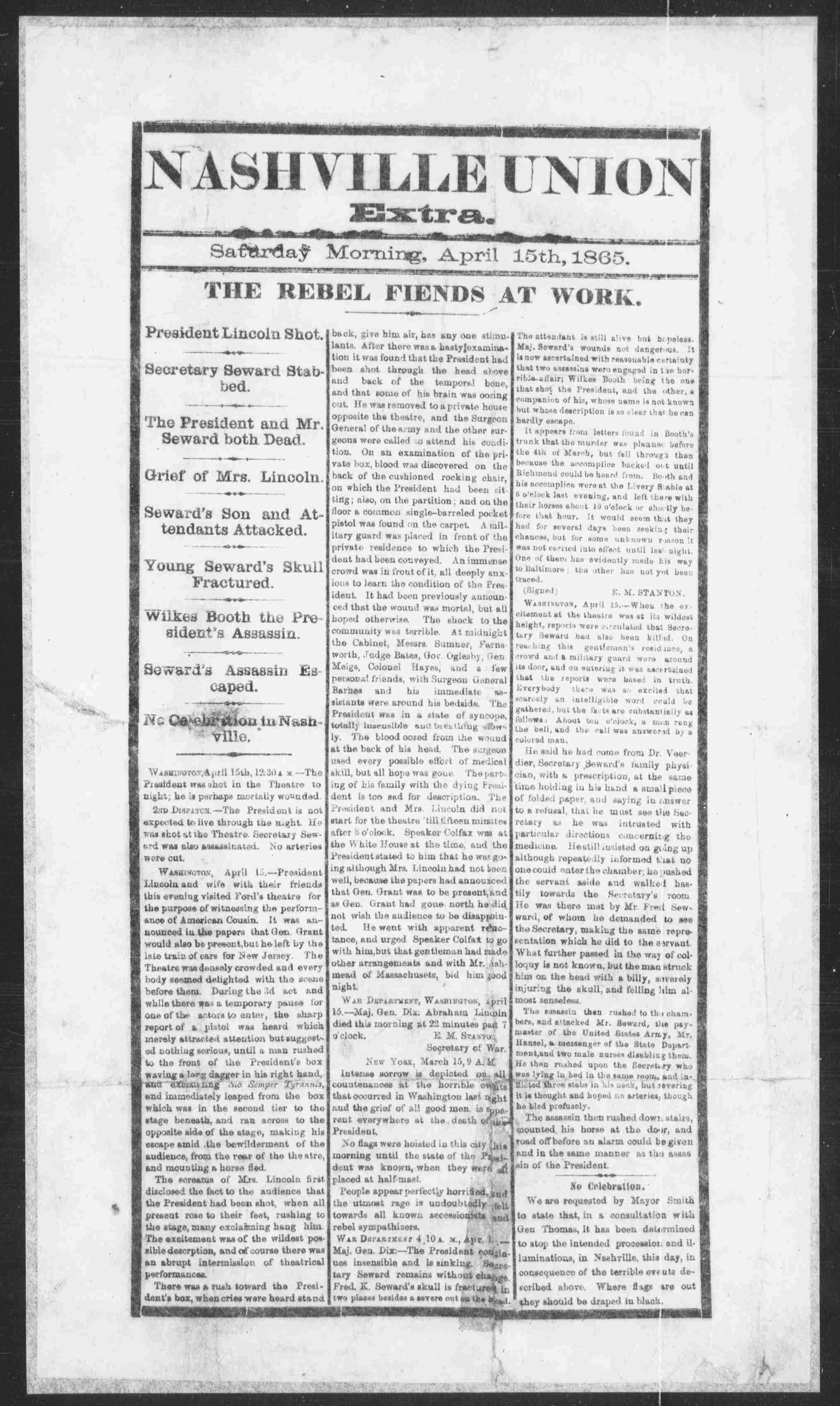
-
Description
The Nashville Daily Union was one of the few newspapers that was established during and that survived the Civil War. This article prints a dispatch from Secretary of War Edward Stanton to Major General Dix recounting the details of Abraham Lincoln's assassination. The article falsely states that Edward Stanton was also killed. It concludes by declaring that a scheduled procession and illuminations in Nashville will not occur as a consequence of these events.
-
Source
Chronicling America: Historic American Newspapers,Library of Congress
-
Rights
This item is in the public domain and may be reproduced and used for any purpose, including research, teaching, private study, publication, broadcast or commercial use, with proper citation and attribution.
-
Creator
The Nashville Daily Union
-
Date
April 15, 1965
from Apr. 15, 1865
Letter from Lincoln's Cabinet to Andrew Johnson
-
Full Title
Letter from Lincoln's Cabinet to Andrew Johnson
-
Description
Lincoln's Cabinet wrote to Andrew Johnson the day of his assassination to inform him of the events and to inform him of the next move for the U.S. government.
-
Transcription
Washington City DC
April 15, 1865, -
Sir:
Abraham Lincoln, President of the United States, was shot by an assassin last evening, at Ford's Theater in this city and died at the hour of 22 minutes of seven o'clock.
About the same time at which the President was shot, an assassin entered the back chamber of the house of Wm H. Seward, Secretary of State, and stabbed him in several places,
in the throat, neck, and face, severely if not mortally wounding him. Other members of the Secretary's family were dangerously wounded by the assassin while making his escape.
By the death of President Lincoln, the office of President has devolved under the Constitution upon you. The emergency of the government demands that you should immediately qualify, according to the requirements of the Constitution and enter upon the duties of President of the United States. If you will please make known your pleasure, such arrangements as you deem proper will be made.
Your Obedient Servants,
Hugh McCulloch Secretary of the Treasury
Edwin M Stanten Secretary of War
Gideon Welles Secretary of Navy
W. Dennison Postmaster General
J.P. Usher Secretary of the Interior
James Speed Attorney General -
Source
U.S. National Archives, General Records of the Department of State
-
Rights
This item is in the public domain and may be reproduced and used for any purpose, including research, teaching, private study, publication, broadcast or commercial use, with proper citation and attribution.
-
Tags
-
Cite this Item
National Archives. "Letter from Lincoln's Cabinet to Andrew Johnson". General Records of the Department of State. Remembering Lincoln. Web. Accessed July 16, 2025. https://rememberinglincoln.fords.org/node/1198
-
Creator
National Archives
-
Publisher
General Records of the Department of State
-
Date
1865-04-15
from Apr. 15, 1865
Letter from Lincoln's Cabinet to Andrew Johnson
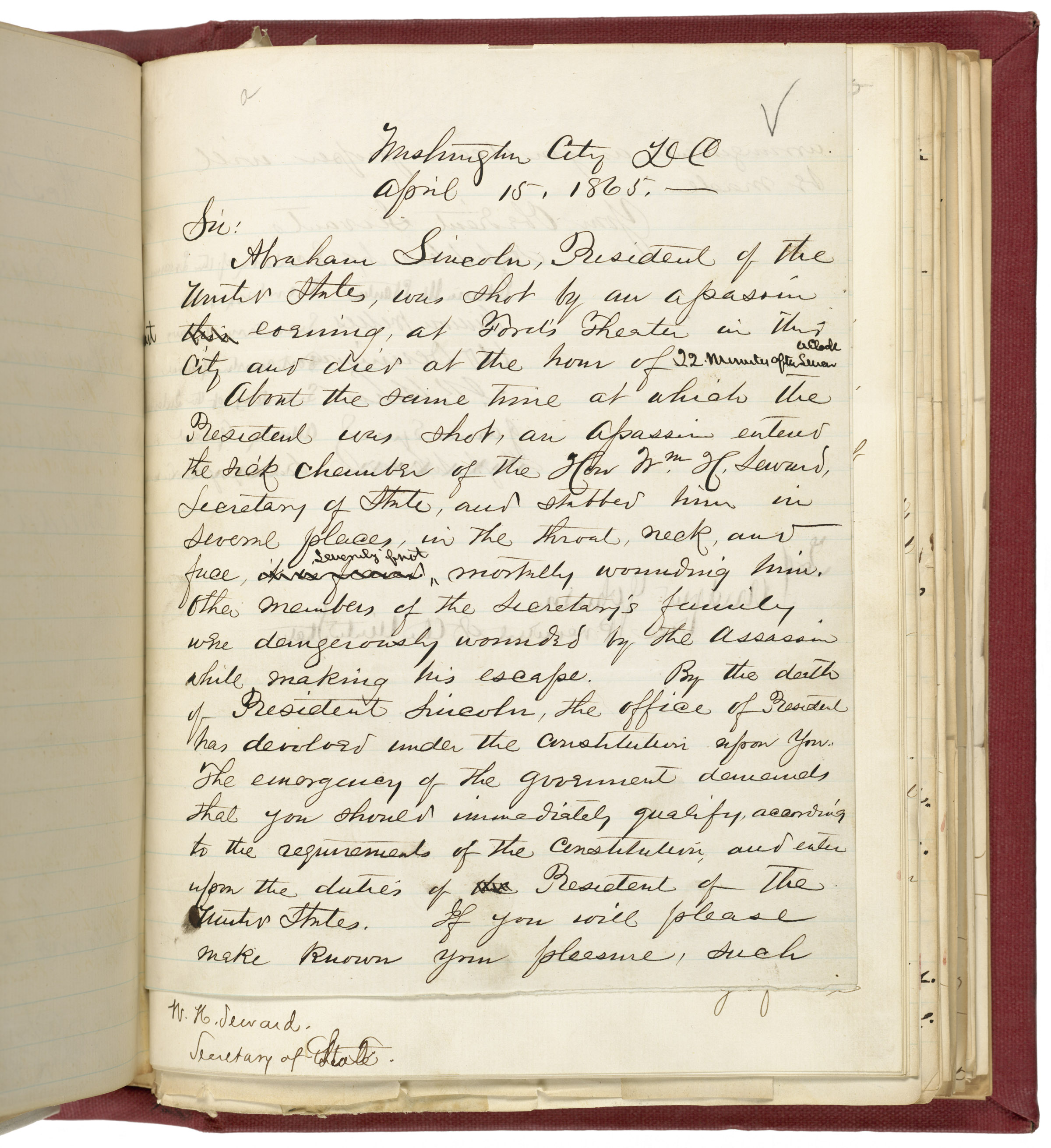
-
Description
Lincoln's Cabinet wrote to Andrew Johnson the day of his assassination to inform him of the events and to inform him of the next move for the U.S. government.
-
Source
U.S. National Archives, General Records of the Department of State
-
Rights
This item is in the public domain and may be reproduced and used for any purpose, including research, teaching, private study, publication, broadcast or commercial use, with proper citation and attribution.
-
Creator
National Archives
-
Publisher
General Records of the Department of State
-
Date
April 15, 1865
from May. 1, 1865
Dr. Charles A. Leale
-
Full Title
Dr. Charles A. Leale
-
Transcription
The Assassination and Death of Abraham Lincoln, President of the United States
by Chl. A. Leale, Asst. Surgeon US Vol. Executive Officer, Armory Square U.S.A. Hosp[ita]l. Washington D. C.
Having been the first of our profession who arrived to the assistance of our late President, and having been requested by Mrs. Lincoln to do what I could for him I assumed the charge until the Surgeon General and Dr. Stone, his family physician arrived, which was about 20 minutes after we had placed him in bed in the house of Mr. Peterson opposite the theatre, and as I remained with him until his death, I humbly submit the following brief account.
I arrived at Ford's Theatre about 8 1/2 P.M. April 14/65 and procured a seat in the dress circle about 40 feet from the Presidents Box. The play was then progressing and in a few minutes I saw the President, Mrs. Lincoln, Major Rathbone and Miss Harris enter; while proceeding to the Box they were seen by the audience, ^[insert] who cheered [/insert] which was reciprocated by the President and Mrs. Lincoln by a smile and [strikethrough] a [/strikethrough] bow. The party was proceeded by an attendant who ofter opening the door of the box and closing it after they had all entered took a seat near by for himself.
The theatre was well filled and the play of "Our American Cousin" progressed very pleasantly until about half past ten, when the report of a pistol was distinctly heard and about a minute after a man of low stature with black hair and eyes, was seen leaping to the stage, beneath holding in his hand a drawn dagger. While descending his heel got entangled in the American flag, which was hung in front of the box, causing him to stumble when he struck the stage, but with a single bound he regained the use of his limbs and ran to the opposite ^[insert] side [/insert] of the stage, flourishing ^[insert] in his hand a drawn [/insert] [strikethrough] his [/strikethrough] dagger and disappearing behind the scene. I then heard cries that the "President has been murdered", which were followed by those of "Kill the murderer", "Shoot him" etc. which came from different parts of the audience. I immediately ran to the President's box and as soon as the door was opened was admitted and introduced to Mrs. Lincoln, where she exclaimed several times "O Doctor, do what you can for him, do what you can"! I told her we would do all ^[insert] that [/insert] we possibly could.
When I entered the box the ladies were very much excited. Mr. Lincoln was seated in a high backed arm-chair with his head leaning towards his right side supported by Mrs. Lincoln, who was weeping bitterly. Miss Harris was near her left and behind the President.
While approaching the President I sent a gentleman for brandy and another for water. When I reached the President he was in a state of general paralysis, his eyes were closed and he was in a profoundly comatose condition, while his breathing was intermittent and exceedingly stertorous. I placed my finger on his right radial pulse but could perceive no movement of the artery.
As two gentlemen now arrived, I requested them to assist me to place him in a recumbent position, and as I held his head and shoulders, while doing this my hand came in contact with a clot of blood near his left shoulder. Supposing that he had been stabbed there I asked a gentleman to cut his coat and shirt off from that part, to enable me if possible to check the haemorrhage, which I supposed took place from the subclavian artery or some of its branches.
Before they had proceeded as far as the elbow I commenced to examine his head (as no wound near the shoulder was found) and soon passed my finger over a large firm clot of blood, situated about one inch below the superior curved line of the occipital bone and an inch and a half to the left of the median line of the same bone. The coagula I easily removed and passed the little finger of my left hand through the perfectly smooth opening made by the ball and found that it had entered the encephalon. As soon as I removed my finger a slight oozing of blood followed and his breathing became more regular and less stertorous. The brandy and water now arrived and a small quantity was placed in his mouth, which passed into his stomach where it was retained.
Dr. C. S. Taft and Dr. A. F. A. King now arrived and after a moments consultation we agreed to have him removed to the nearest house, which we immediately did, the above named with others assisting. When we arrived at the door of the box, the passage was found to be densely crowded by those who were rushing toward that part of the theatre. I called out twice "Guards clear the passage," which was so soon done that we proceeded without a moments delay with the President and were not in the slightest interrupted until he was placed in bed in the house of Mr. Peterson, opposite the theatre, in less than 20 minutes from the time that he was assassinated. The street in front of the theatre before we had left it was filled with the excited populace, a large number of whom followed us into the house. As soon as we arrived in the room offered to us, we placed the President in bed in a diagonal position; as the bed was too short a part of the foot was removed to enable us to place him in a comfortable position. The windows were opened and at my request a Captain, present made all leave the room except the medical gentlemen and friends. As soon as we placed him in bed we removed his clothes and covered him with blankets. While covering him I found his lower extremities of the ecchymosis until it encircled the orbit extending above the supra orbital ridge and below the infra orbital foramen. The wound was kept open by the Surgeon General by means of ^[insert] a [/insert] silver probe, and as the President was placed diagonally on the bed, his head was supported in its position by Surgeon Crane and Dr. Taft ^[insert] (relieving each other) [/insert]
About 2 A. M. the Hospital Steward, who had been sent for a Nelatons probe, arrived and an examination was made by the Surgeon General, who introduced it to a distance of about 2 1/2 inches, when it came into contact with a foreign substance, which laid across the track of the ball. This being easily passed the probe was introduced several inches further, where it again touched a hard substance, which was at first supposed to be the ball, but as the bulb of the probe on its withdrawal did not indicate the mark of lead, it was generally thought to be another piece of loose bone. The probe was introduced a second time and the ball was supposed to be distinctly felt by the Surgeon General, Surgeon Crane and Dr. Stone. After this second exploration nothing further was done with the wound except to keep the opening free from cogula, which if allowed to form and remain for a very short time, would produce signs of increased compression; the breathing becoming profoundly stertorous and intermittent and the pulse to be more feeble and irregular. His pulse which was several times counted by Dr. Ford and noted by Dr. King, ranged until 12 P. M. from between 40 to 64 beats per minutes, and his respiration about 24 per minute, were loud and stertorous. At 1 A. M. his pulse suddenly increased in frequency to 100 per minute, but soon diminished gradually becoming less feeble until 2:54 A. M. when it was 48 and hardly perceptible. At 6:40 A. M. ^[insert] his [/insert] pulse could not be counted, it being very intermittent, two or three pulsations being felt and followed by an intermission, when not the slightest movement of the artery could be felt. The inspirations now became very short and the expirations very prolonged and labored accompanied by a guttural sound. 6.50 A.M. The respirations cease for some time and all eagerly look at their watches until the profound silence is disturbed by a prolonged inspiration which was soon followed by a sonorous expiration. The Surgeon General now held his finger to the carotid artery, Col. Crane held his head, Dr. Stone, who was sitting on the bed, held his left pulse, and his right pulse was held by myself. At 7.20 A.M. he breathed his last and "the spirit fled to God who gave it."
During the course of the night the room was visited by many of his friends. Mrs. Lincoln with Mrs. Senator Dixon came into the room three of four times during the night. The Presidents son, Captn R. Lincoln, remained with his father during the greater part of the night. Immediately after death had taken place, we all bowed and the Rev Dr. Gurley supplicated to God in behalf of the bereaved family and our afflicted country.
[Stamped: The National Archives of The United States] [Right Margin Vertical Text: D No 776]
True Copy
Chas. A. Leale M.D. -
Source
-
Rights
This item is in the public domain and may be reproduced and used for any purpose, including research, teaching, private study, publication, broadcast or commercial use, with proper citation and attribution.
-
Tags
-
Cite this Item
National Archives. "Dr. Charles A. Leale". War Department. The Adjutant General's Office. Remembering Lincoln. Web. Accessed July 16, 2025. https://rememberinglincoln.fords.org/node/1197
-
Creator
National Archives
-
Publisher
War Department. The Adjutant General's Office
-
Date
1865
from May. 1, 1865
Dr. Charles A. Leale
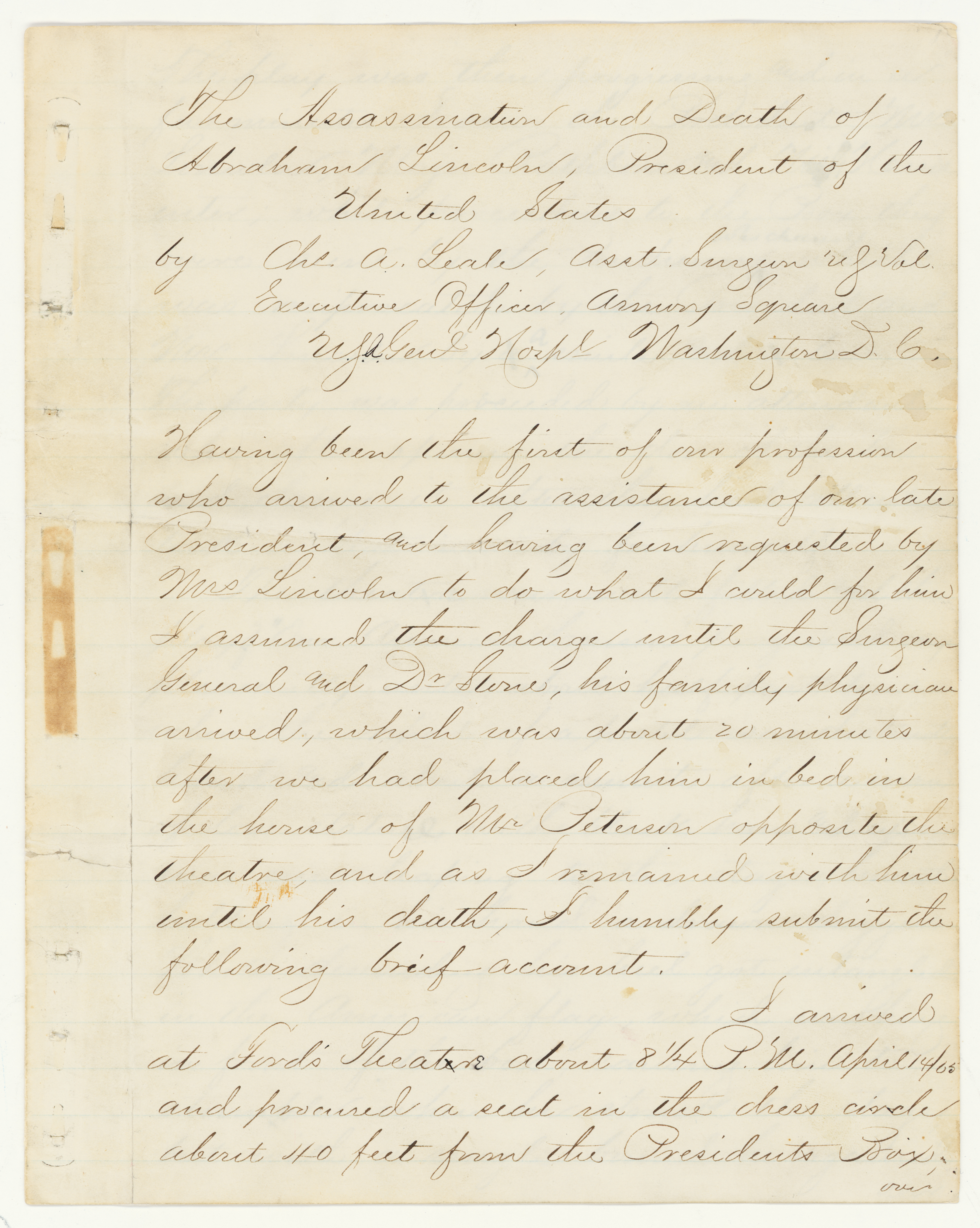
-
Source
-
Rights
This item is in the public domain and may be reproduced and used for any purpose, including research, teaching, private study, publication, broadcast or commercial use, with proper citation and attribution.
-
Creator
National Archives
-
Publisher
War Department. The Adjutant General's Office
-
Date
May 1, 1865
from Apr. 15, 1865
Susan B. Anthony's Diary
-
Full Title
Susan B. Anthony's Diary
-
Description
Susan B. Anthony was a women's rights activist and suffragette. Before and during the Civil War, she was also heavily involved in the anti-slavery movement. She wrote about the Lincoln assassination in her diary after she learned of the news on April 15th and over the following days.
-
Source
Library of Congress, Manuscript Division, Susan B. Anthony Papers
-
Rights
This item is in the public domain and may be reproduced and used for any purpose, including research, teaching, private study, publication, broadcast or commercial use, with proper citation and attribution.
-
Tags
-
Cite this Item
Susan B. Anthony. "Susan B. Anthony's Diary". Remembering Lincoln. Web. Accessed July 16, 2025. https://rememberinglincoln.fords.org/node/1189
-
Creator
Susan B. Anthony
-
Date
April 15, 1865
from Apr. 15, 1865
Susan B. Anthony's Diary

-
Description
Susan B. Anthony was a women's rights activist and suffragette. Before and during the Civil War, she was also heavily involved in the anti-slavery movement. She wrote about the Lincoln assassination in her diary after she learned of the news on April 15th and over the following days.
-
Source
Library of Congress, Manuscript Division, Susan B. Anthony Papers
-
Rights
This item is in the public domain and may be reproduced and used for any purpose, including research, teaching, private study, publication, broadcast or commercial use, with proper citation and attribution.
-
Creator
Susan B. Anthony
-
Date
April 15, 1865
from Apr. 17, 1865
Edwin Stanton to William Tecumseh Sherman
-
Full Title
Edwin Stanton to William Tecumseh Sherman
-
Description
A letter from Secretary of War, Edwin Stanton, to General William Tecumseh Sherman detailing the assassination of Lincoln and the attack on Seward.
-
Transcription
^[[$100]]
The following dispatch was received by Gen’l Sherman from Sec’y Sherman. [[?]] is furnished for the information of Brig’d Gen’l E.W. Rice.
“President Lincoln was murdered at 10-o’clock last night in the private box at Ford’s Theatre in this city by an assassin who shot him through the head with a pistol ball. About the same time the Seward’s house was entered by another assassin, who stabbed the secretary ^[[in]] several places, but it is thought he may possibly recover; but his son Fred will probably die of wounds received from the assassin. The assassin of the President, leapt from the box, brandishing a dagger, exclaiming “Sic semper tyrannis” and that “Virginia was revenged”. Mr. Lincoln fell senseless from his seat and continued in that state until 22 after 1’ o clock, at which time he breathed his last. Gen’l Grant was published to be at the theatre, but he did not go. Vice President Johnson now becomes President and will take the oath of office and assume the duties today. I have no time to add more except to say that I find evidence that an assassin is also on your track and I beseech you to be more heedful than Mr. Lincoln was of such knowledge.
(over)
(Sgd.) Edwin Stanton
Sec'y of War
Washington April 17 - 17 D.C.
By order of Brevet Major General Jas. M. Corse
L.H. Everts
Asst. Adjt. Genl.
[transcription by Alli Hartley-Kong] -
Source
Special Collections Research Center, University of Chicago Library
-
Rights
This item is in the public domain and may be reproduced and used for any purpose, including research, teaching, private study, publication, broadcast or commercial use, with proper citation and attribution.
-
Tags
-
Cite this Item
Edwin Stanton. "Edwin Stanton to William Tecumseh Sherman". Remembering Lincoln. Web. Accessed July 16, 2025. https://rememberinglincoln.fords.org/node/1182
-
Creator
Edwin Stanton
-
Date
April 17, 1865
from Apr. 17, 1865
Edwin Stanton to William Tecumseh Sherman
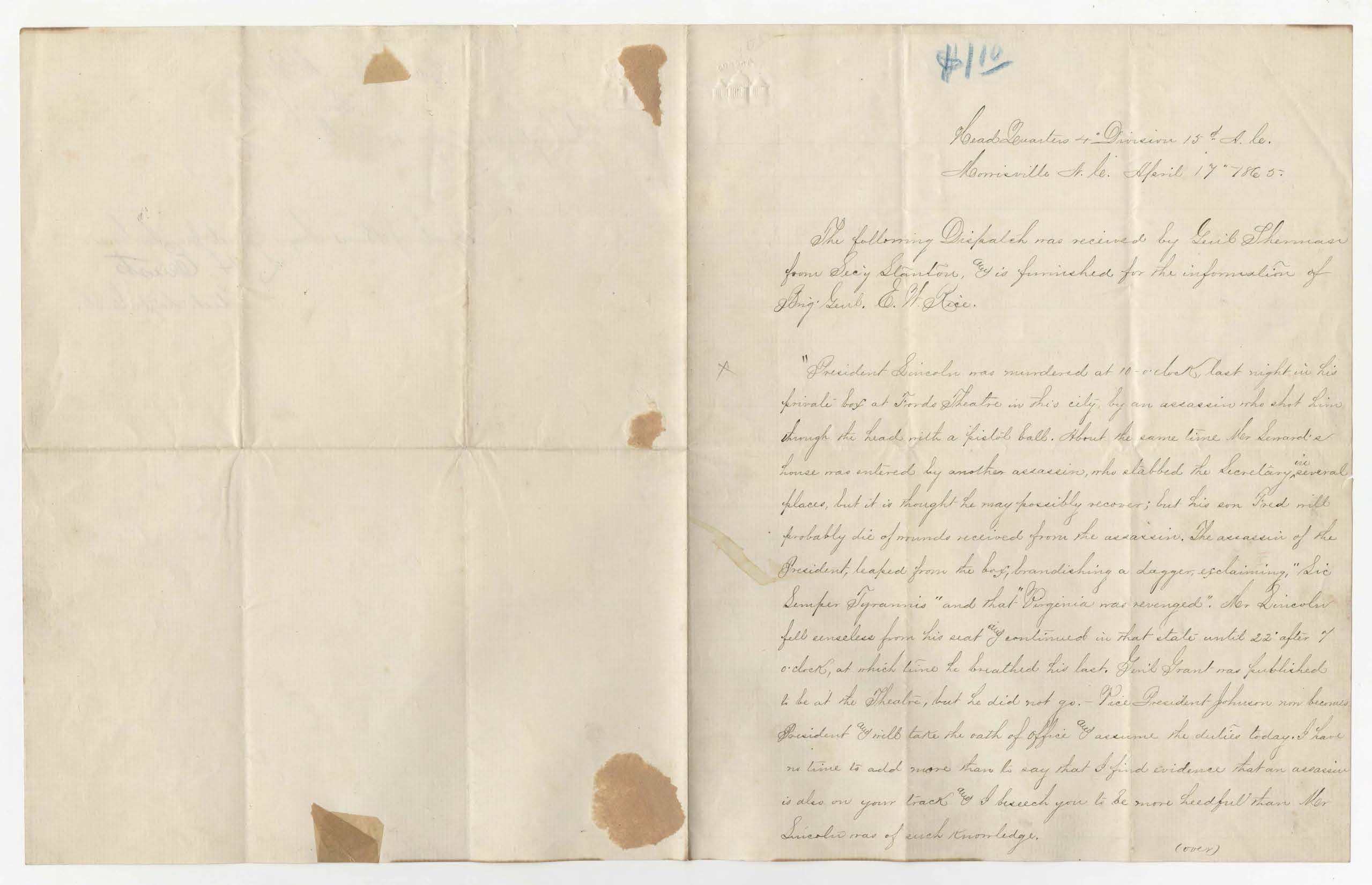
-
Description
A letter from Secretary of War, Edwin Stanton, to General William Tecumseh Sherman detailing the assassination of Lincoln and the attack on Seward.
-
Source
Special Collections Research Center, University of Chicago Library
-
Rights
This item is in the public domain and may be reproduced and used for any purpose, including research, teaching, private study, publication, broadcast or commercial use, with proper citation and attribution.
-
Creator
Edwin Stanton
-
Date
April 17, 1865
from Apr. 28, 1865
John Wilkes Booth, El Asesino Del Presidente Lincoln
-
Full Title
John Wilkes Booth, El Asesino Del Presidente Lincoln: Despatchos Telegraficos
-
Description
In this article from the California-based periodical, El Voz del Nuevo Mundo (commonly referred to as El Nuevo Mundo,) the details of Lincoln's assassination and of John Wilkes Boothe's ultimate demise.
-
Source
infoweb.newsbank.com
-
Rights
N/A
-
Tags
-
Cite this Item
El Voz del Nuevo Mundo. "John Wilkes Booth, El Asesino Del Presidente Lincoln: Despatchos Telegraficos". El Voz del Nuevo Mundo. Remembering Lincoln. Web. Accessed July 16, 2025. https://rememberinglincoln.fords.org/node/1106
from Apr. 28, 1865
John Wilkes Booth, El Asesino Del Presidente Lincoln: Despatchos Telegraficos

-
Description
In this article from the California-based periodical, El Voz del Nuevo Mundo (commonly referred to as El Nuevo Mundo,) the details of Lincoln's assassination and of John Wilkes Boothe's ultimate demise.
-
Source
infoweb.newsbank.com
-
Rights
N/A
-
Creator
El Voz del Nuevo Mundo
-
Publisher
El Voz del Nuevo Mundo
-
Date
April 28, 1865
-
Material
newspaper
from Apr. 14, 1865
Diary of Orville Hickman Browning
-
Full Title
Diary of Orville Hickman Browning, Friend of Lincoln - Excerpts from April 14-19, 1865
-
Description
These are the diary entries of former U.S. Senator and friend of President Lincoln, Orville Hickman Browning, the day of Lincoln's assassination up to the funeral in Washington, DC on April 19, 1865. Browning discusses how he heard about the attacks and incorrectly states the Secretary of State Seward was killed. He talks about how Lincoln was the South's best ally within the government and speculates who the attacker was. Over the next few days he visits the White House and describes the body of the fallen president. These excerpts are part of the “Diary of Orville Hickman Browning Volume II: 1865-1881,” published in 1925 by the Illinois State Historical Library. Born in Kentucky in 1806, Browning moved to Quincy, Illinois to become a lawyer. Later he served as a U.S. Senator, adviser to Abraham Lincoln and Andrew Johnson, and even a cabinet minister. Browning and Lincoln became friends while serving in the state legislature; both were members of the Whig party. Browning served as an ally for Lincoln during his presidency.
-
Source
Hathi Trust Digital Library
-
Rights
The written permission of the copyright owners and/or other rights holders (such as publicity and/or privacy rights) is required for distribution, reproduction, or other use of protected items beyond that allowed by fair use or other statutory exemptions.
-
Tags
-
Cite this Item
Orville Hickman Browning. "Diary of Orville Hickman Browning, Friend of Lincoln - Excerpts from April 14-19, 1865". Illinois State Historical Library. Remembering Lincoln. Web. Accessed July 16, 2025. https://rememberinglincoln.fords.org/node/1098
-
Creator
Orville Hickman Browning
-
Publisher
Illinois State Historical Library
-
Date
April 14, 1865
-
Dimensions
22 cm.
from Apr. 14, 1865
Diary of Orville Hickman Browning, Friend of Lincoln - Excerpts from April 14-19, 1865
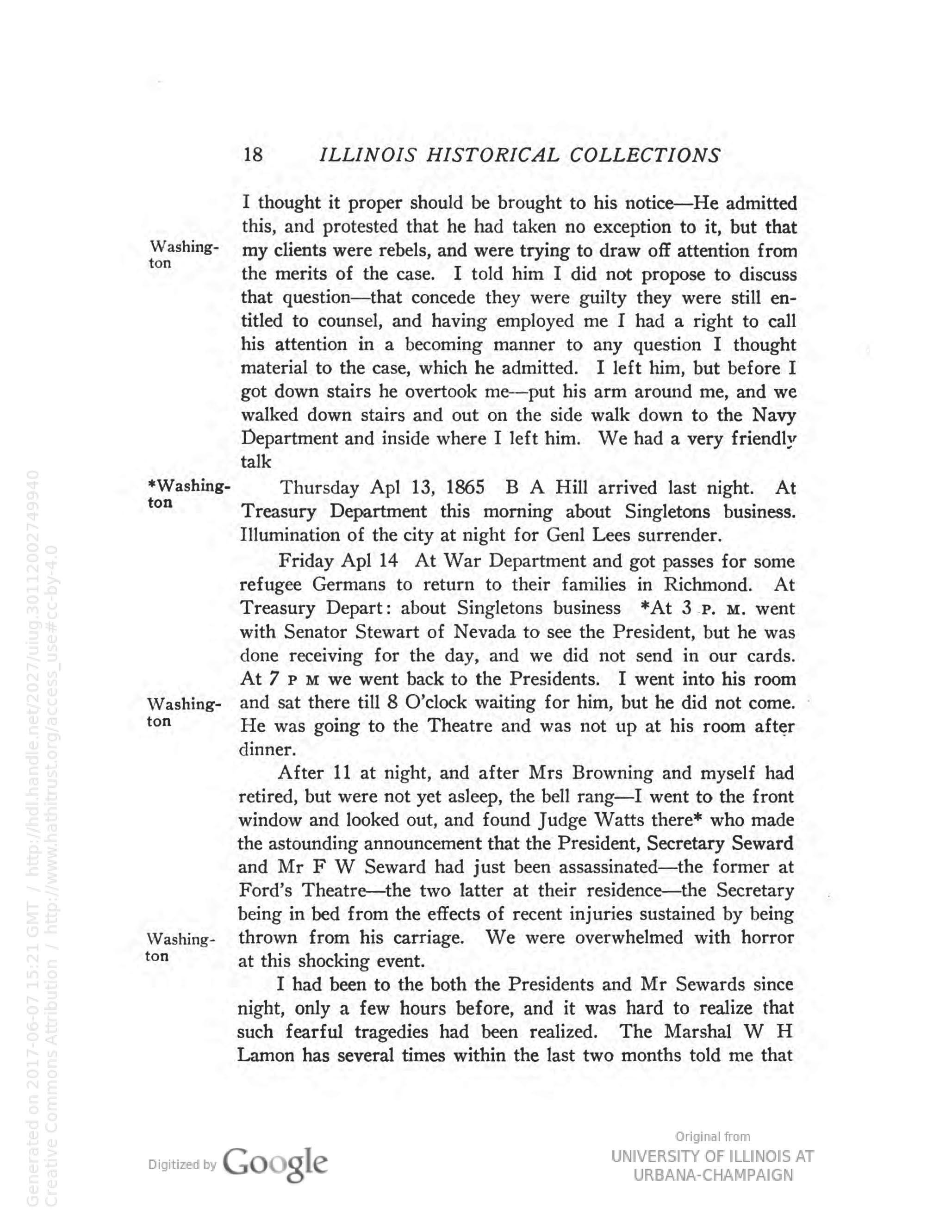
-
Description
These are the diary entries of former U.S. Senator and friend of President Lincoln, Orville Hickman Browning, the day of Lincoln's assassination up to the funeral in Washington, DC on April 19, 1865. Browning discusses how he heard about the attacks and incorrectly states the Secretary of State Seward was killed. He talks about how Lincoln was the South's best ally within the government and speculates who the attacker was. Over the next few days he visits the White House and describes the body of the fallen president. These excerpts are part of the “Diary of Orville Hickman Browning Volume II: 1865-1881,” published in 1925 by the Illinois State Historical Library. Born in Kentucky in 1806, Browning moved to Quincy, Illinois to become a lawyer. Later he served as a U.S. Senator, adviser to Abraham Lincoln and Andrew Johnson, and even a cabinet minister. Browning and Lincoln became friends while serving in the state legislature; both were members of the Whig party. Browning served as an ally for Lincoln during his presidency.
-
Source
Hathi Trust Digital Library
-
Rights
The written permission of the copyright owners and/or other rights holders (such as publicity and/or privacy rights) is required for distribution, reproduction, or other use of protected items beyond that allowed by fair use or other statutory exemptions.
-
Creator
Orville Hickman Browning
-
Publisher
Illinois State Historical Library
-
Date
April 14, 1865
-
Dimensions
22 cm.
